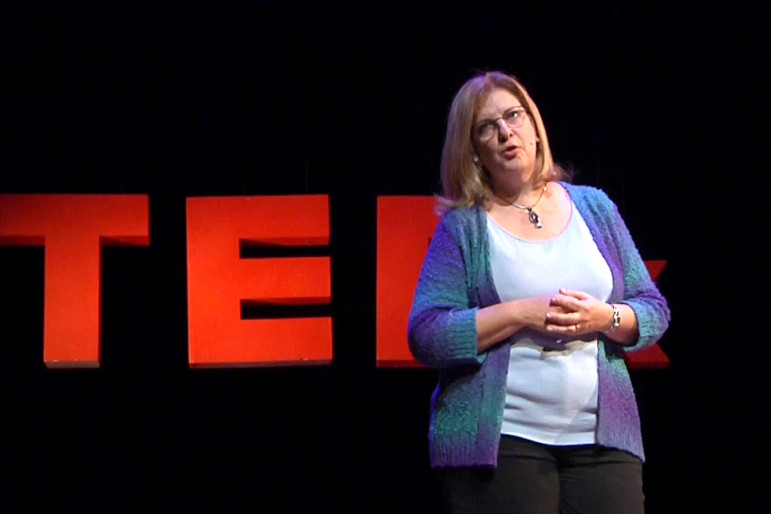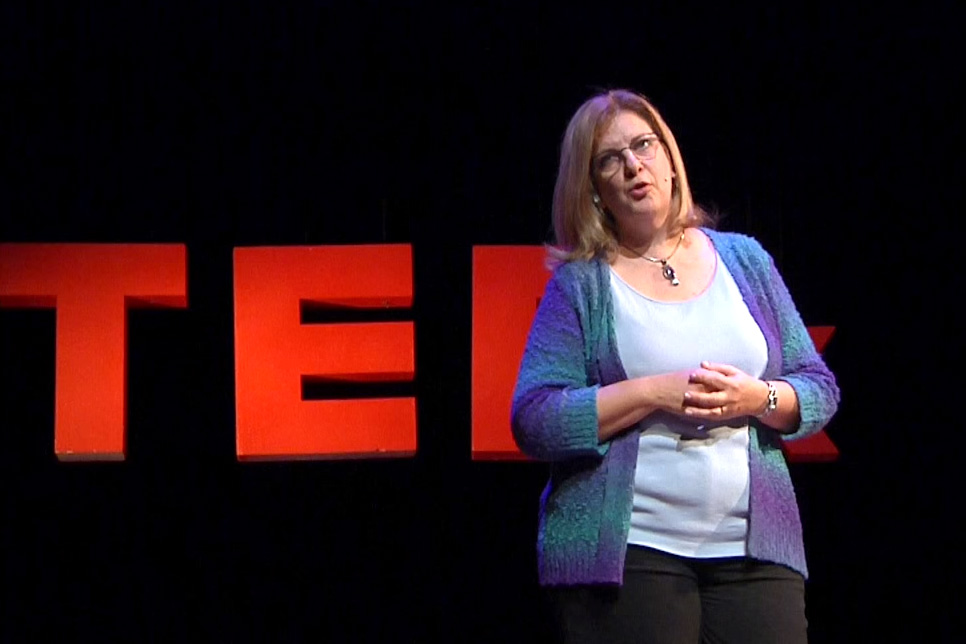
TEDx Talks
Michele Deitch asks "Why are we trying kids as adults?" in her TEDx Talk at Amherst College on Dec. 19, 2014.
Supporters of overhauling juvenile justice in Texas cheered the passage of two state bills even as some mourned the failure of a third that would have stopped the prosecution of 17-year-olds as adults.
Lawmakers voted overwhelmingly to restructure the state Juvenile Justice Department’s network of youth correctional facilities to keep teens closer to their homes in the sprawling state — a method that has been increasingly deployed in large states. And they voted to stop hauling kids into court for truancy, currently a misdemeanor criminal charge.
But a closely watched measure that would have ended the routine prosecution of 17-year-olds in the state’s adult court system fell short over the weekend. The House of Representatives had voted to add the “raise-the-age” provision to the Senate’s juvenile justice bill, but House and Senate negotiators agreed to strip out the amendment before a final vote Sunday. That leaves Texas as one of only nine states that still regularly prosecute 17-year-old as adults.
“There were really three major juvenile justice bills that people were watching this session, and two out of the three passed,” said Michele Deitch, a University of Texas juvenile justice expert. “We should feel really good about those changes. I think they are certainly moving the state in the right direction.”
While the failure of raise-the-age legislation is disappointing, she said, “I think that it’s the obvious next step in the reforms that Texas has been implementing over the last seven to eight years.”
Democratic State Rep. Gene Wu, who got the raise-the-age proposal added to the Senate bill, said he refused to sign the conference committee report in a “symbolic protest.” But he said supporters would keep working to get 17-year-olds out of adult courts between now and the Legislature’s next session in two years.
“We understood that Senate Bill 1630 was a very important piece of reform legislation, and we didn’t want to jeopardize it,” Wu told reporters Sunday afternoon. The bill “is going to make a huge difference to our juvenile population and especially to our courts.”
But, he added, “We want to treat kids as kids. We want them to have a chance to make mistakes, to learn and to grow from it, and not be saddled with something that affects their lives from then on because of one mistake.”
The main opponent of the raise-the-age measure was state Sen. John Whitmire, the chairman of the Senate Criminal Justice Committee and the lead author of the juvenile justice bill. Whitmire, also a Democrat, told the Texas Observer in April that “a 17-year-old knows right from wrong” and questioned whether they would be any safer in juvenile lockups than in adult facilities, where jailers are required to keep them shielded from older inmates.
Whitmire did not respond to a request for comment on Monday, as lawmakers rushed to finish up their biennial legislative session. But Ana Yáñez-Correa, executive director of the Texas Criminal Justice Coalition, said Whitmire has told supporters that he would conduct a new study of the proposed bill before the Legislature convenes again in 2017.

Ana Yáñez-Correa
“In a lot of states, it takes them a really long time to raise the age,” Yáñez-Correa said. “This is our first time that we’ve actually done it, and I’m very hopeful that next session, if we get the appropriations necessary, that we’re going to be in a position where it becomes a reality.”
Meanwhile, she said, the juvenile justice bill has several provisions “that we really liked,” including the expansion of the independent ombudsman’s office to investigate complaints at the county level, a new requirement for using a validated risk assessment tool to better place teens committed to the system and a ban on using refurbishing adult jail facilities to house juvenile offenders.
The bills that did pass have been sent to the desk of the state’s Republican governor, Greg Abbott, who is expected to sign both.
In 2013, 17-year-olds made up about 3 percent of adult arrests, according to a report by the state House Juvenile Justice Committee. Nearly half were arrested for theft, marijuana possession or public drunkenness.
More than 500 teens who were 17 at the time of their offenses were sent to prison in 2014, while almost 7,600 more were put on probation in the adult system, the state Legislature’s budget office reported. Putting those youths through juvenile courts would have cost the state about $16 million of its 200 billion-plus budget in the coming year, and about $57 million by 2020.
The cost to counties was harder to calculate, the estimate noted. Officials in Harris County, which includes Houston, said they would have to spend nearly $70 million to build a new juvenile detention center and juvenile court while saving about $6 million by transferring youths out of adult lockups. But Yañez-Correa said other states that have raised the age have seen costs come in lower than expected.
Deitch, who teaches at UT-Austin’s Lyndon B. Johnson School of Public Affairs and testified to a House committee on the bill, said the juvenile justice overhaul that did pass will require the state and counties to make “some pretty significant adjustments” as well. It would have made more sense to have included programs for 17-year-olds at the same time, she said.
“Rather than say, ‘OK, make all these changes now, and we’ll come back next session and ask you to make another set of adjustments in that session,’ let’s make all those changes at once and figure out what they need to do this correctly,” Deitch said.

When does the truancy change become effective?
My daughter, 10th grade, was found cutting LUNCH. She was then placed in ISS for 3 full days (with no classwork provided), had to go to court, went to 4 weeks of a night class (for what we don’t know), missed another class so an outside counsellor could talk to her about peer pressure (she cut class alone), had to do 20 hours of community service, paid a $300 fine and has to turn in quarterly attendance reports to the court. Oh, and she’s on the honor roll.
Meanwhile a classmate was caught shoplifting. She had to pay $150 fine and do 8 hours of community service!